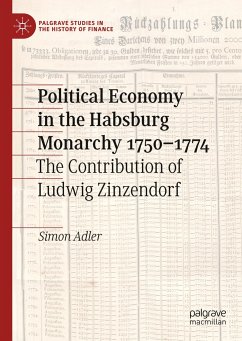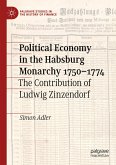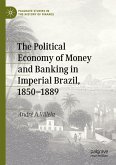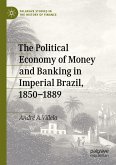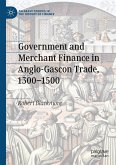Political Economy in the Habsburg Monarchy is an important study of the contribution of Austrian Enlightenment economist Ludwig Zinzendorf to the political economy of the Habsburg monarchy in the mid eighteenth century. Simon Adler provides the first comprehensive analysis, and first ever study in English, of the development of Zinzendorf's thinking on the economy, commerce and, above all, state finances. Political Economy in the Habsburg Monarchy shows the extent to which Zinzendorf's insights were part of the wider European movement dedicated to understanding political economy as an independent and important activity. It establishes Zinzendorf, a protégé of the State Chancellor Wenzel Anton Kaunitz, as a pivotal figure in the development of Austrian economic and financial policies during the 1750s and 1760s and explains how he challenged cameralism using the most advanced European economic ideas, notably from French writers around Vincent de Gournay. This book is based uponwide-ranging research of primary sources and comprehensive coverage of secondary literature and adds significantly to the ongoing historiographical turn towards political economy in the eighteenth century.
Hinweis: Dieser Artikel kann nur an eine deutsche Lieferadresse ausgeliefert werden.
Hinweis: Dieser Artikel kann nur an eine deutsche Lieferadresse ausgeliefert werden.
"This important book is astonishingly the first modern study of Count Ludwig Zinzendorf (1721-80), eighteenth-century Austria's leading political economist in both theory and practice. ... this study expands and deepens our knowledge of the policymaking debates that shaped a crucial moment in the history of Habsburg government. Its successes are assuredly attributable ... ." (William D. Godsey, The Journal of Modern History, Vol. 95 (2), June, 2023)
"The book discusses Zinzendorf's intellectual advancement through seven richly detailed chapters, each revealing new installments to both the theoretical and practical side of eighteenth-century disputes on political economy. ... The greatest value of the volume lies in its comparative analysis. ... Due to the long descriptions and thorough analysis of Zinzendorf's economic texts, the book reads rather easily for experts. All in all, the book merits scholarly attention and hopefully will lead to further contributions in the field." (Tibor Bodnár-Király, Austrian History Yearbook, Vol. 53, May, 2022)
"Adler does not deal in generalizations or abstract concepts; his preferred method is to describe events with close reference to the sources, and to categorize and interpret strictly on the basis of empirical findings. As a result, his study produces substantial insights that are relevant to a number of different fields-not just economic history, but also intellectual and administrative history, as well as the history of the fiscal-military state. Adler's book therefore deserves a wider readership than just historians of the Habsburg monarchy." (Esteban Mauerer, German Historical Institute London Bulletin, Vol. 44 (1), May, 2022)
"The great value of this study is that it updates our understanding of eighteenth-century political economy in the Germanic world by carefully and convincingly tracing the connections of one demonstrably important economist-administrator, Ludwig Zinzendorf, to a politically influential and often theoretically refined school of economic thinkers." (Paul Cheney, The European Journal of the History of Economic Thought, Vol. 43 (1), March, 2021)
"The book discusses Zinzendorf's intellectual advancement through seven richly detailed chapters, each revealing new installments to both the theoretical and practical side of eighteenth-century disputes on political economy. ... The greatest value of the volume lies in its comparative analysis. ... Due to the long descriptions and thorough analysis of Zinzendorf's economic texts, the book reads rather easily for experts. All in all, the book merits scholarly attention and hopefully will lead to further contributions in the field." (Tibor Bodnár-Király, Austrian History Yearbook, Vol. 53, May, 2022)
"Adler does not deal in generalizations or abstract concepts; his preferred method is to describe events with close reference to the sources, and to categorize and interpret strictly on the basis of empirical findings. As a result, his study produces substantial insights that are relevant to a number of different fields-not just economic history, but also intellectual and administrative history, as well as the history of the fiscal-military state. Adler's book therefore deserves a wider readership than just historians of the Habsburg monarchy." (Esteban Mauerer, German Historical Institute London Bulletin, Vol. 44 (1), May, 2022)
"The great value of this study is that it updates our understanding of eighteenth-century political economy in the Germanic world by carefully and convincingly tracing the connections of one demonstrably important economist-administrator, Ludwig Zinzendorf, to a politically influential and often theoretically refined school of economic thinkers." (Paul Cheney, The European Journal of the History of Economic Thought, Vol. 43 (1), March, 2021)
